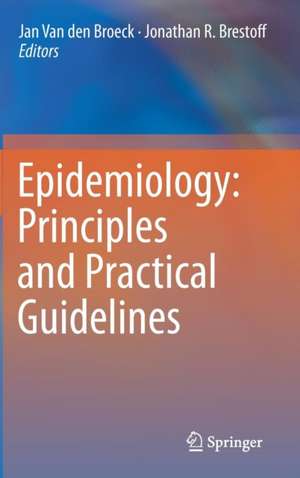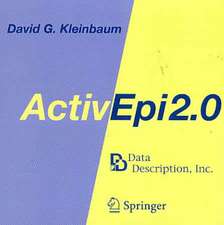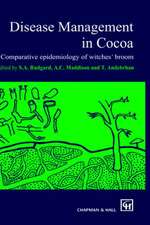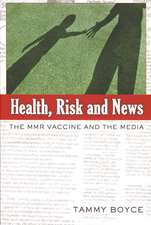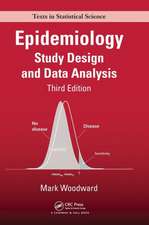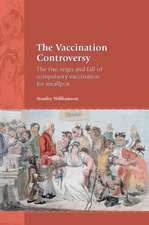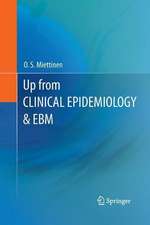Epidemiology: Principles and Practical Guidelines
Editat de Jan Van Den Broeck, Jonathan R Brestoffen Limba Engleză Hardback – 8 mai 2013
| Toate formatele și edițiile | Preț | Express |
|---|---|---|
| Paperback (1) | 1404.59 lei 6-8 săpt. | |
| SPRINGER NETHERLANDS – 19 mai 2015 | 1404.59 lei 6-8 săpt. | |
| Hardback (1) | 1424.16 lei 6-8 săpt. | |
| SPRINGER NETHERLANDS – 8 mai 2013 | 1424.16 lei 6-8 săpt. |
Preț: 1424.16 lei
Preț vechi: 1499.12 lei
-5% Nou
Puncte Express: 2136
Preț estimativ în valută:
272.68€ • 283.94$ • 226.24£
272.68€ • 283.94$ • 226.24£
Carte tipărită la comandă
Livrare economică 13-27 februarie
Preluare comenzi: 021 569.72.76
Specificații
ISBN-13: 9789400759886
ISBN-10: 9400759886
Pagini: 470
Ilustrații: XVIII, 621 p.
Dimensiuni: 155 x 235 x 30 mm
Greutate: 1.38 kg
Ediția:2013
Editura: SPRINGER NETHERLANDS
Colecția Springer
Locul publicării:Dordrecht, Netherlands
ISBN-10: 9400759886
Pagini: 470
Ilustrații: XVIII, 621 p.
Dimensiuni: 155 x 235 x 30 mm
Greutate: 1.38 kg
Ediția:2013
Editura: SPRINGER NETHERLANDS
Colecția Springer
Locul publicării:Dordrecht, Netherlands
Public țintă
ResearchCuprins
Preface.- Part I Introduction.- Definition and Scope of Epidemiology.- Basic Concepts in Epidemiology.- Roots and Future of Epidemiology.- Part II Study Design.- General Study Objectives.- The Specific Aims.- General Study Designs.- Study Size Planning. Sponsoring and Stakeholder Involvement.- The Recruitment and Enrollment Plan.- The Measurement Plan.- The Quality Assurance and Control Plan.- The Data Management Plan.- The Analysis Plan.- Ethics Support.- Part III Study Conduct.- Training and Study Preparations.- Managing the Informed Consent Process.- Accrual, Retention and Adherence.- Questionnaires.- Maintaining Data Integrity.- Data Cleaning.- Good Clinical Practice.- Part IV: Study Analysis.- Statistical Estimation.- Statistical Testing.- Statistical Modeling.- Systematic Reviews and Meta-analyses.- The Ethics of Study Analysis.- Part V Study Reporting.- Interpretation of Findings.- Scientific Writing.- Reporting Data Quality.- Dissemination to Stakeholders.- The Ethics ofStudy Reporting.- Bibliography.- Subject Index.
Recenzii
From the reviews:
“This book follows the logical stages of a research project while introducing the major epidemiological concepts and practices. … For students and practitioners such as field epidemiologists, this book is very important. … it is most appropriate for epidemiology students working on their dissertations or researchers (MD, resident) who want to start a research project. … This is a very interesting book because of its practical nature and thoroughness for field epidemiologists. It is an excellent addition to epidemiology advanced courses … for PhD students.” (Ousmane Diallo, Doody’s Book Reviews, July, 2013)
“This book follows the logical stages of a research project while introducing the major epidemiological concepts and practices. … For students and practitioners such as field epidemiologists, this book is very important. … it is most appropriate for epidemiology students working on their dissertations or researchers (MD, resident) who want to start a research project. … This is a very interesting book because of its practical nature and thoroughness for field epidemiologists. It is an excellent addition to epidemiology advanced courses … for PhD students.” (Ousmane Diallo, Doody’s Book Reviews, July, 2013)
Textul de pe ultima copertă
This textbook presents epidemiology in a practical manner, contextualized with discussions of theory and ethics, so that students and professionals from all academic backgrounds may develop a deep appreciation for how to conduct and interpret epidemiological research. Readers will develop skills to:
· Search for and appraise literature critically
· Develop important research questions
· Design, plan, and implement studies to address those questions
· Develop proposals to obtain funding
· Perform and interpret fundamental statistical estimations, tests,and models
· Consider the ethical implications of all stages of research
· Report findings in publications
· Advocate for change in the public health setting Epidemiology is and will remain a discipline in motion, and this textbook aims at reflecting this dynamism and keeping pace with its momentum. This textbookis not only a classroom tool with high utility but also an essential reference and guide for those engaging in research involving human subjects.
· Search for and appraise literature critically
· Develop important research questions
· Design, plan, and implement studies to address those questions
· Develop proposals to obtain funding
· Perform and interpret fundamental statistical estimations, tests,and models
· Consider the ethical implications of all stages of research
· Report findings in publications
· Advocate for change in the public health setting Epidemiology is and will remain a discipline in motion, and this textbook aims at reflecting this dynamism and keeping pace with its momentum. This textbookis not only a classroom tool with high utility but also an essential reference and guide for those engaging in research involving human subjects.
Caracteristici
lllumination of each step of the research process demystifies practical aspects of producing scientific evidence A step-by-step approach allows readers to develop, implement, interpret, and report epidemiological research Integration of theory, practice, and ethics prepares readers to become conscientious researchers Discussions of contemporary approaches and topics alongside emerging paradigm shifts situates readers at the forefront of epidemiological research
